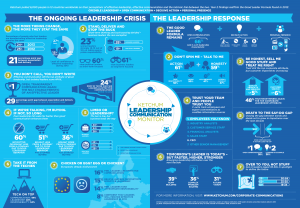That is certainly one conclusion of this year’s Ketchum Leadership Communication Monitor (KLCM), a global study polling 6,000 consumers across 12 countries on their views of effective leadership, effective communication and the link between the two.
The study again underlines the extent of public disappointment with leaders across the board – just one in four feel leaders overall are performing well, with only 23% of respondents viewing leaders as being accountable when things go wrong.
And for the second year in a row, there is an overwhelming expectation for business, political and other categories of leaders to be open, honest, decisive and personally accessible. With the acceleration of citizen journalism, 24/7 media scrutiny and networked consciousness, engaging authentically with, and valuing, employees, investors and expert commentators, is this year shown to be every bit as important as giving a good interview or hosting an impressive AGM
Ironically, the digital and social media channels that act as the greatest thorn in the side or, conversely, the making of many of today’s leaders are also those shown by the KLCM data to be the most challenging in terms of establishing leadership credibility – a very 21st Century double whammy.
Against this global backdrop, it is noteworthy that the UK leads the world in making trustworthiness the number one requirement for a corporation to be seen as a leader. Mirroring this expectation at a corporate level, the 2013 UK data see communicating in an open, transparent way (at 64%), leading by example (63%) and admitting mistakes (61%) as the most important characteristics of the effective individual UK leader.
Set against these high standards of individual and corporate probity, the British sit among the most disillusioned globally with their leaders’ performance. For example, the UK deemed leaders of non-profit organisations (23%) and business leaders (21%) to be most effective communicators in 2013 – scores nonetheless still well below the relevant global averages (35% and 29%, respectively).
Perhaps unsurprisingly at this time of on-going economic flux and deep budget cuts, UK politicians rank near the bottom of list in terms of accountability and long-term thinking. And off a pretty modest base, the effectiveness of the UK political leaders’ communication dropped by 15 percentage points from 32% to 17% in 2013 compared with last year’s study – with only 23% trusting UK politicians entirely when quoted in the media.
There are, of course, certain notable exceptions to the rule, with Boris Johnson more popular than ever and one of the few to buck a trend that sees 45% of Brits saying they have less confidence in their political leaders’ performance in 2013. Why? Because whatever one thinks of certain recent media appearances, he is arguably one of the few UK politicians adhering to the ‘good leader formula’ revealed by KLCM 2012 and confirmed unambiguously by this year’s study – that credible leadership hinges on a combination of open communication, decisive action and the personal presence of the leader.
Crucially, this blend of openness, action and the personal touch yields undoubted dividends from a business perspective, with the most effective corporate leaders acting almost as brands in their own right, capable of attracting investors and consumers alike. Figures from the UK Investor Relations Society suggest that up to 76% of investment decisions are based on whether investors trust management to deliver on their promises. Jessops’ return to the British high street after a two-month absence as part of a £5m investment by telecoms entrepreneur Peter Jones is a prime example of this dynamic in action.
What’s more, the 2013 KLCM data show a clear causal link between perceptions of poor leadership behaviour and actual consumer behaviour – underlining the direct business cost of poor leadership. KLCM 2013 shows 51% of consumers globally as having boycotted a corporation or purchased less of its products and services over the past 12 months because of poor leadership perceptions. The 40% figure for the UK is somewhat lower, though enormously important nonetheless.
The lessons for leaders from two years of KLCM data are clear – follow the good leader formula; avoid any ‘say-do’ gaps between words and deeds; acknowledge the critical role of employees as corporate ambassadors; recognise that ‘traditional’ media are far from dead; and under-estimate at your peril the importance of product quality and customer service. And moving forward, the KLCM finding that the number one quality expected from tomorrow’s leader is the ability to build and inspire teams who, together, will create the future, should give pause for thought to those minded to view leadership a solitary, muscular pastime.
For an eye-opening example of leadership communication in action, you might find it interesting to see this clip of Ketchum’s CEO, Rob Flaherty, creatively bringing KLCM to life through illustration. And an accessible overview of the 2013 study’s key findings is available from me through this PR Week TV video interview.



